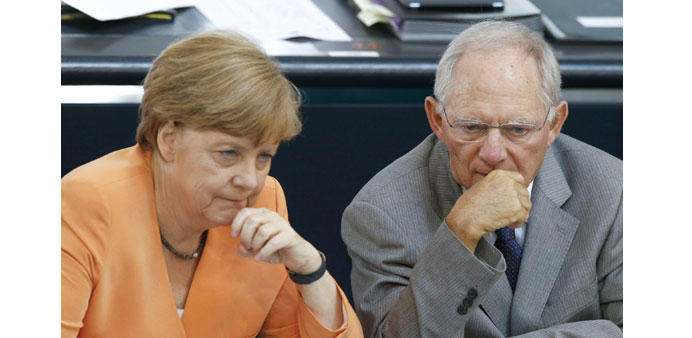Reuters
Berlin
One by one, leading figures in the German government made their way to the podium in the sun-drenched chamber of the Bundestag yesterday and accused Greek Prime Minister Alexis Tsipras of betraying his own people.
A day after Greece became the first advanced country to default to the International Monetary Fund, frustration in Berlin bubbled over, with politicians openly questioning whether they could negotiate in good faith with Tsipras if he survives a Greek referendum he has called for Sunday.
Finance minister Wolfgang Schaeuble, whose tough line in aid talks with Athens has turned him into a hate-figure in Greece, had the harshest words for the Tsipras government, accusing it of dramatically worsening the situation in the country, and saying repeatedly “I feel sorry for the Greeks”.
“This government has done nothing since it came into office,” Schaeuble said in a speech to the lower house of parliament during a special session on the Greek crisis.
“We don’t know if the Greek government is going to hold a referendum or not, whether it is for or against it. You can’t in all honesty expect us to talk with them in a situation like this.”
Schaeuble said any future negotiations with the Tsipras government would take place under “much more difficult conditions”, bemoaning the lack of trust between the Greek government and its eurozone partners.
Chancellor Angela Merkel was more measured, describing the Greeks as a “proud people” and stressing that the door to talks remained opened.
However she also made clear that she would not negotiate with Tsipras before the referendum and signalled that any future bailout programme would come under the umbrella of the European Stability Mechanism (ESM), with tougher conditions, vetted by the German parliament.
“The Greeks have not fulfilled their obligations,” Merkel said, referring to the missed IMF payment. She expressed concern for the Greek people who she said had “very difficult days” ahead of them.
Opposition politicians heckled members of the government before taking to the podium themselves to criticise Merkel’s handling of the crisis.
Gregor Gysi of the far-left Linke, the closest German party to Tsipras’s Syriza, accusing the government of pursuing regime change in Athens.
“You want to get rid of the leftist government in Greece, that is your goal,” Gysi said, drawing jeers from coalition lawmakers.
“Without a doubt these have been turbulent days but especially for the Greek people,” Merkel said. “We have to think of the people in Greece.”
The leaders insisted that Europe was strong enough to withstand the shockwaves that would likely result if Greek voters rejected reform in the referendum, possibly paving the way for Greece to crash out of the euro.
Europe could wait calmly for the outcome of the referendum, said Merkel, “because Europe is strong, much stronger than five years at the beginning of the European sovereign debt crisis”.
“And that’s why the present situation is undoubtedly a big challenge for us,” she said. “But it’s a misery for the Greek people.”
In his comments Merkel’s deputy, Social Democrat Party leader Sigmar Gabriel blamed successive governments in Athens for the nation’s current plight.
Gabriel described the Greek people as “victims” of years of corruption and political patronage in the nation, which joined the euro in January 2001.
“I think we underestimated how large the institutional problems in (Greece) are,” Gabriel told German parliamentarians. He accused governments in Athens of “laying the country to waste” over decades.
Schaeuble lashed out at Tsipras, saying his government’s zigzag course since it was elected in January had meant that the Greek people had been unable to benefit from the improved economic conditions that other parts of the eurozone were now starting to enjoy.
“The situation has become dramatically worse,” Schaeuble told parliament in a highly charged speech. “It worsens every day and every hour.”
Earlier in the day at a press conference, Schaeuble said he was “stunned” about the way the Greek government “has led its nation and its people” into such a situation, which has prompted temporary bank closures and capital controls.

Chancellor Merkel speaks with finance minister Wolfgang Schaeuble.
